Are any of these Top 5 Steinway piano myths true?
July 9, 2021 •Stephen Reed
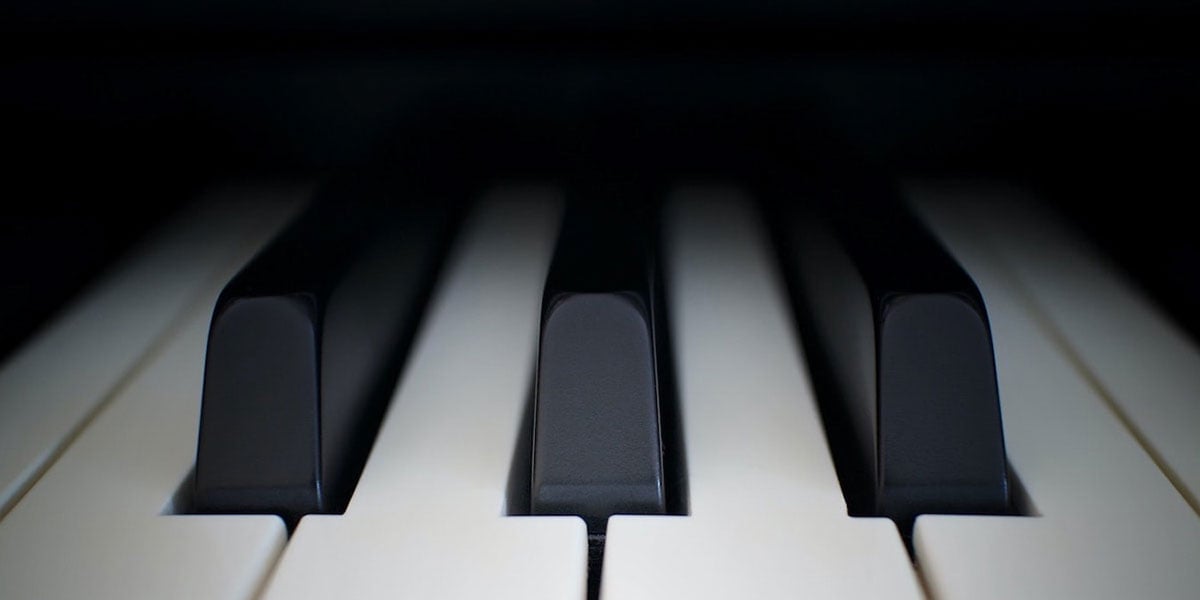
Say the name “Steinway” and images of beautiful, resonant pianos fill the imagination. Much of this imagery is due to solid facts regarding the exceptional craftsmanship and design that has been the trademark of Steinway & Sons pianos for over 170 years.
Along with this high-quality has come awards and distinctions. Yes, Steinway & Sons’ pianos have been the choice of American presidents and Buckingham Palace. And yes, 97% of concert pianists worldwide prefer to play a Steinway, believing that this brand of piano helps them bring forth the best musical performance within them.
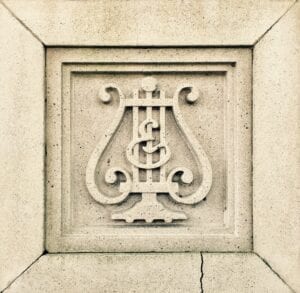
For all these real achievements, Steinway, like every international brand, has some myths that should be addressed. Separating truth from fiction can help us understand what is truly outstanding about Steinways and what some may use to mislead prospective buyers for their own purposes.
Addressing such myths is part of M. Steinert & Sons’ business as New England’s authority on Steinway pianos since 1869. Our piano consultants keep abreast of new developments in the Steinway line, as well as assertions made by others about Steinway instruments.
By keeping track of such myths, we are able to serve our customers who may have heard unsubstantiated information from sources like online forums.
Below, we will examine the Top 5 Steinway Myths to determine whether any of them hold water.
Steinway Myth #1: The “Golden Age of Steinway” produced better pianos.
If there is any “Golden Age of Steinway,” that era is today. The vast majority of top pianists and the best performance halls in the world today would agree that today’s Steinway pianos are the finest instruments yet made by Steinway & Sons.
Throughout Steinway’s history, some of Steinway’s competitors, be they used piano sellers or other piano brands, have perpetuated a prior, mythical "Golden Age" of older Steinway pianos.
Their years for this imagined “Golden Age” cover the period of time when Steinways typically become worn out (any age exceeding about 75 years) and which, conveniently, are in need of restoration.
In addition, more pianos were produced during the mid-20th Century, so the used piano market is awash with thousands of older used Steinways.
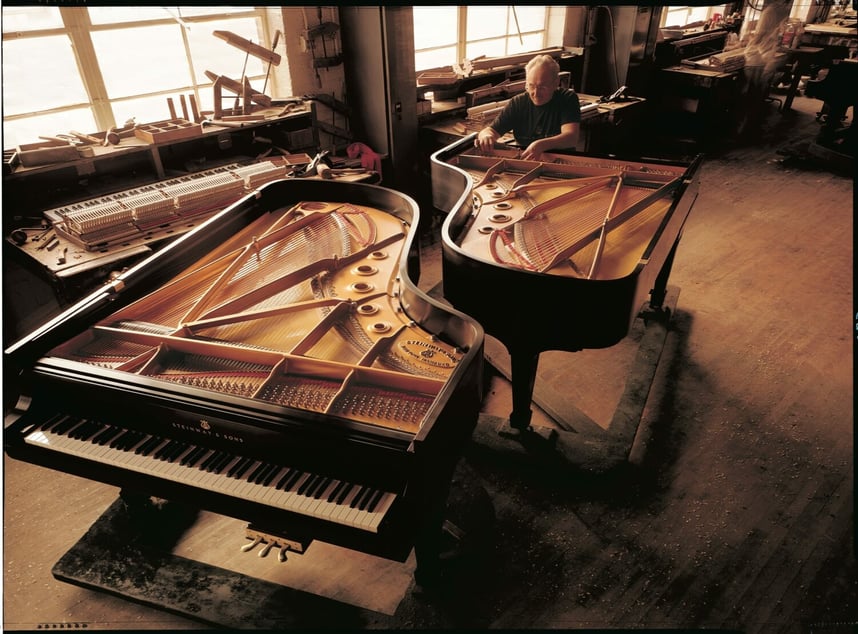
Such restoration firms may do an acceptable job rebuilding old Steinways, but they overstep when they falsely claim that the old designs, materials, and workmanship were superior to today or that their restoration workmanship is “unparalleled.”
The truth is that the piano designs these firms are restoring are now in many respects technologically and musically obsolete. Moreover, technologies, equipment, materials, and expertise necessary to the construction of current Steinway designs are not available to them.
Moreover, the accuracy, precision, material excellence, manufacturing methodologies, equipment, and advanced designs of the newest Steinways far exceed those of previous generations.
For good reason, today’s leading music conservatories and symphonies categorically invest only in new Steinways for their performance halls and faculty studios. New Steinways are state-of-the-art. The best Steinways have always been and still are new.
Again, the only genuine Steinway Golden Age is today.
So Myth #1 is FALSE.
Steinway Myth #2: Older is better
Even without the “Golden Age of Steinway” legend, another, similar myth makes the rounds now and then. This is the more generalized myth that older pianos are inherently better than newer pianos.
But the truth is that, while Steinways go down in value more gradually than other premium piano brands, they, too, depreciate in value with the passage of every year after being sold.

Generally speaking, pianos are at their performance peak in their first ten years. Whenever a performing arts center or music institution needs another piano, a new piano is their first choice.
Music institutions' budgets are frequently tight these days. If older pianos were better, why would they not save money and buy a used one instead?
Today, over 95% of the major piano concerts in North America are performed on Steinway & Sons pianos that are typically 10 years of age or less.
In terms of quality, a used piano’s tone does not have as great of a dynamic range as a new piano, and the action is not as responsive.
While it is possible for older pianos to be acceptable to some players, the piano never plays or sounds as good as it did when it was new.
As a result, Myth #2 is FALSE.
Image above: Elio Villaquara, Steinway Artist, with a Model D.
Steinway Myth #3: Steinway & Sons makes their pianos in Asia
Steinway & Sons have been making their pianos in New York since 1853 and in Hamburg, Germany since 1880. Steinway has no intention to move either factory.
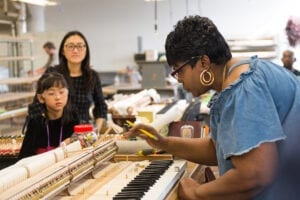
For example, the craftspeople who have been making each Steinway over twelve months in Astoria have developed a community there that would be impossible to replicate elsewhere.
However, the Steinway family of pianos does include two lines manufactured in Asia to serve the entry-level piano market. Those lines are Boston and Essex.
Steinways continue to be handcrafted at a rate of only 1,250 pianos per year at the Astoria factory and a similar number is made at the Hamburg, Germany factory. When a company is handcrafting pianos over 12 months rather than more quickly manufacturing them, the quality is superior.
Spreading a myth that Steinways are now made in Asia is a clear attempt to bring Steinways down to the same manufacturing level as other pianos. This is an attempt to bolster their claim that a used Steinway somehow has more value than a new Steinway.
For quality and performance, the latest, a new Steinway, still made in America, remains the best option over a used Steinway.
Nevertheless, a certified used Steinway, purchased from a Steinway dealer, can have a significant amount of value left in it, depending on its age and condition.
Myth #3 is FALSE.
Steinway Myth #4: The internet is the best source for information about purchasing a Steinway.
The internet can be a source of information, gleaned from pieces like this one. Such online information, from credible sources, can be a great starting point to learn about Steinways, new and used.
However, the internet can also be a source of misinformation. In internet chat rooms, people who give advice often have their own agendas. Some may try to sow doubt in the mind of the consumer about other brands or exaggerate the value of their used piano inventory.
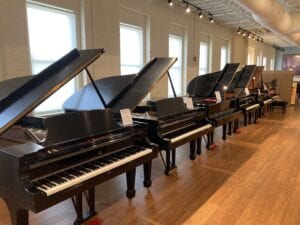 Consider the value of visiting a Steinway showroom, trying out the pianos there, talking face-to-face with a piano consultant. Now contrast that with taking advice from an online source expert whom one has never met.
Consider the value of visiting a Steinway showroom, trying out the pianos there, talking face-to-face with a piano consultant. Now contrast that with taking advice from an online source expert whom one has never met.
Often such online sources talk about the benefits of purchasing a piano which they have never heard or played.
Oftentimes, the hunt for piano information on the internet will lead to piano forums. Such forums are a mixture of those not connected to the piano industry and piano technicians and salespeople who offer their opinions to steer people in a direction favorable to them.
Such salespeople rarely work for one of the few Steinway dealers.
This is not to say that some experienced members of the piano industry don’t have interesting insights. However, their understanding of Steinway & Sons products can be quite limited.
For example, many online voices offer dated views due to having little experience with new Steinway & Sons pianos. Many have never played the other Steinway-designed lines, so a new Boston or Essex piano is foreign to them. They offer advice on pianos they haven’t personally heard or played.
The best source of information on Steinway is an authorized Steinway piano dealer like M. Steinert & Sons, where you can physically hear and play a variety of pianos.
Additionally, a visit to a Steinway dealer allows you to talk face-to-face with an expert who has helped many other customers find the piano that is the right fit for their needs.
Myth #4 is FALSE.
Steinway Myth #5: Piano rebuilders can make a used Steinway “good as new.”
Piano rebuilders and restorers who are not Steinway dealers are unable to help a used Steinway become “good as new.” This is because they cannot get a pin block or soundboard--two Steinway-defining parts of the piano. Steinway only sells those to their dealers.
Labor is hugely variant in the rebuilding community, ranging from top notch to shoddy opportunists trying to trade on the Steinway name. Even some skilled rebuilders take extreme shortcuts when they think that the buyer will not notice. Sadly, this is often true.
At M. Steinert & Sons, certified used Steinway pianos must be 30 years of age or younger. While all new pianos depreciate in value after the sale, Steinways do depreciate more gradually than other brands.
As a result, depending on age, condition, and whether or not any restoration was done by a Steinway dealer, a used Steinway can still have considerable value and many years of quality piano playing in it.
Still, if one can afford a new Steinway, it will always be the best overall value as it represents the culmination of nearly 170 years of improvements by Steinway & Sons engineers, designers, and craftspeople.
Myth #5 is FALSE.
Myths about Steinways were bound to occur
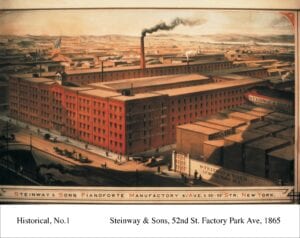 Steinway has built a historic reputation for nearly 170 years.
Steinway has built a historic reputation for nearly 170 years.
Myths like the ones detailed above were probably destined to crop up, simply because a successful, international brand like Steinway naturally becomes a target for those with their own agenda.
Myths like these simply do not hold water under closer inspection.
Again, some will try to use Steinway’s credibility to sell a low value piano to an unsuspecting buyer. Others try to cut down Steinways in online forums to help another brand. Steinway & Sons have long understood that this is an unfortunate price to be paid for success.
The savvy piano buyer will do extensive research first to understand the real value a quality Steinway has to offer--and how to screen out low value pianos of one variety or another.
A visit to a Steinway showroom like those available through M. Steinert & Sons is a crucial step in one’s education about Steinway pianos. Their touch and tone simply cannot be experienced online.
See for yourself why today’s professional concert pianists believe that a new Steinway is the most evolved piano, one that brings out their best as a musician.
For more reading, look further into the difference between New and Used Steinways.
Featured Articles
Categories
- Beginner Pianos (24)
- Boston Pianos (16)
- Comparisons (30)
- Designer and Specialty Pianos (8)
- Essex Pianos (10)
- Events (11)
- Featured (24)
- Institutional (3)
- Joy of Piano (15)
- Learning About Pianos (72)
- News (35)
- Pricing and Cost (19)
- Resource Center (125)
- Roland Pianos (6)
- Spirio (15)
- Steinway Pianos (71)
- Student (14)
- Teacher (13)
- Used Pianos (21)
- Videos (19)

